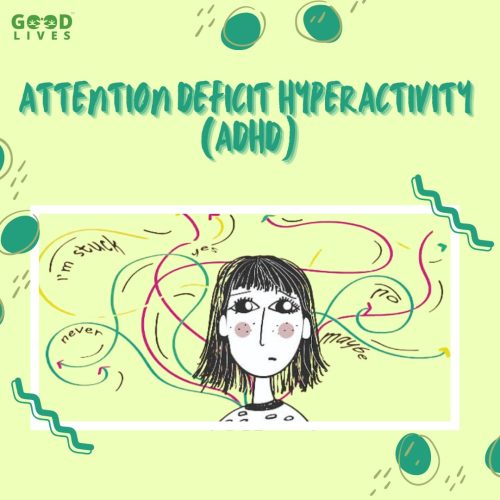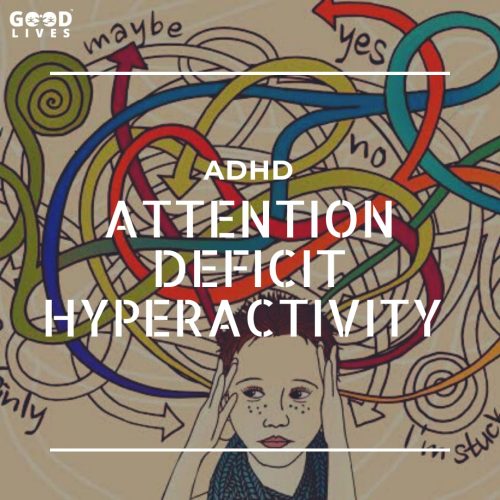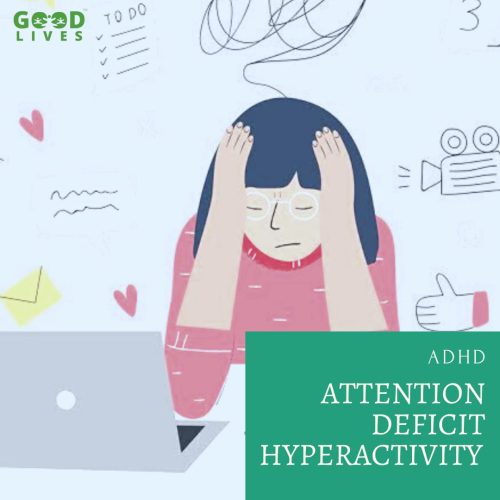What is (ADHD) ?

Do you have a tendency to forget things? Maybe you can’t sit still or engage in impulsive behavior. You may be thinking that this is rather normal behavior, but what if this behavior persists over time?
That’s when attention deficit hyperactivity disorder (ADHD) enters the picture!
Attention deficit hyperactivity disorder (ADHD) is a mental health problem. That causes excessive hyperactivity and impulsive behavior. Many persons with ADHD experience inattention and energy fluctuations. It begins in childhood and might last throughout adulthood. The American Psychiatric Association recognizes ADHD.
1) Difference between ADD and ADHD
Attention deficit disorder (ADD) is an outdated term used before 1987. It was renamed in the 1990s after which it evolved into Attention deficit hyperactivity disorder (ADHD).
2) ADHD Symptoms

ADHD symptoms were described in the early 1990s. It’s a real condition that affects a lot of people. There are three subtypes of behavioral symptoms associated with ADHD: The symptoms vary from person to person. The symptoms must be present for longer than six months to be diagnosed.
- Predominantly Inattentive
- Predominantly hyperactive-impulsive
- Combined-Symptoms of both mentioned above are equally present in the person.
Predominantly Inattentive: People with inattentive ADHD may experience the following symptoms:
- Not paying close attention to details
- Making careless mistakes
- Trouble focusing on tasks or conversations
- Distracted while listening
- Not following instructions
- Not completing tasks
- Losing things
- Trouble in organizing tasks
- Fidgeting
- Tapping of hands or feet
- Not being able to stay seated
- Talking to much
- Not being able to wait for their turn
- Grabbing things from others
- Interrupting conversation
- Little or no sense of danger
Predominantly Hyperactive or Impulsive: People with hyperactive or impulsive ADHD can experience the following symptoms:
3) Related Conditions in Children and Teenagers with Attention Deficit Hyperactivity Disorder
- Anxiety disorder: Causes feelings of anxiety, fear, nervousness, worry, or dread. It can also induce physical symptoms such as a pounding heart, sweating, and dizziness.
- Oppositional defiant disorder (ODD): An occasional outburst of frustration and disobedience behavior toward authoritative figures like parents and teachers. Symptoms include unpleasant mood, rebellious, argumentative behavior, and aggression that lasts more than six months.
- Conduct disorder: This is a behavioral and emotional disorder. Symptoms include being aggressive, disruptive, deceptive, and rebellious behavior toward rules.
- Sleep problems & learning difficulties
- Autistic spectrum disorder(ASD): Affects communication and behavior.
- Epilepsy: A disorder that affects the brain, and causes repeated fits or seizures.
- Tourette syndrome: Causes involuntary repetitive movements or vocal sounds.
Did you know?
ADHD is far more common than autism. ADHD is the topmost mental or developmental disorder among children in the United States; children under the age of 18 with ADHD outweigh those with an autistic spectrum disorder.4) Related Condition of ADHD in Adults
- Personality disorders: Someone who thinks, perceives, feels, or relates with others in a way that is markedly different from the average person.
- Bipolar disorder: Causes shifts in a person’s mood and energy levels.
- Obsessive-compulsive disorder (OCD): A condition in which a person has uncontrolled, recurring thoughts such as checking things and cleaning.
- Sleep problems & learning difficulties.
Did you know?
Depression is common for ADHD in adults. The behavioral problems linked with attention deficit hyperactivity disorder can also cause trouble in relationships and social interaction.Depression isolates you, creating a barrier between you and the rest of the world. You do not have to live with it if you choose not to. Take a simple step and read 7 Possible Ways to Treat Depression & Restore Happiness in Your Life

Experts are unsure of the exact cause of attention deficit hyperactivity disorder, although several factors can be responsible.
- Genetics: According to research, heredity may play a role in the development of ADHD. Children are more prone to have the disorder themselves if parents and siblings have attention deficit hyperactivity disorder. Statistics say that 76% of children with attention deficit hyperactivity disorder have a relative with ADHD. However, the inheritance of ADHD is likely to be complicated, and it is not assumed to be linked to a single genetic flaw.
- Brain anatomy and function:
Attention and activity-level-controlling regions of the brain are less active. - Brain injuries: These occurred either in the womb or as a result of a severe head injury later in life.
- Environmental causes: Toxins like lead can harm a child’s brain development and contribute to attention deficit hyperactivity disorder.
- Prematurity: Infants born prematurely before the 37th week of pregnancy or with low birth weight and smoking, drinking, and substance abuse during pregnancy can affect the infant’s brain.
6) Treatment of Attention Deficit Hyperactivity Disorder
The most effective treatment for ADHD is a mix of medication and therapy.
-
Medication: Medications are not a cure for ADHD, but they can help reduce hyperactive and impulsive behavior and increase attention span in those who have the condition.
-
Behavior therapy: Behaviour treatment includes behavior management. It involves using a reward system to encourage children to control their attention deficit hyperactivity disorder symptoms. Letting the child know what is expected from them. They will then be given a tiny incentive for excellent behavior and a privilege taken away for bad behavior.
-
Psychotherapy: It helps people with ADHD in learning better ways to deal with their emotions and frustration, and improves their self-esteem. Family members may take up counseling to understand a child or adult with ADHD.
-
Social skills training: Can be used to teach habits such as sharing and taking turns.
-
Special education: Aids a student’s learning in school structure and a routine can be quite beneficial to children with attention deficit hyperactivity disorder.
7) How Does Attention Deficit Hyperactivity Disorder Feel?
Let us imagine you met someone new, and they introduced themselves to you, but you have no clue what their name is after 5 seconds. What if you were reading a book and realized after a few pages that you have no idea what those pages were about; you now have to re-read the entire thing since you were thinking about something else. It’s almost like your mind is racing in ten different directions. Each thought stops for a second before moving on to the next. This is how it feels to have ADHD.
One of the adverse effects of ADHD is an inability or difficulty in concentrating and staying still. You will not know you had been swiftly shaking your leg or tapping your hands until someone pointed it out to you. You may wonder why these body movements happen because such motions help release excess energy and improve focus.
ADHD symptoms in children often appear between the ages of 3 and 6 and can last until adulthood. However, some individuals may outgrow it. ADHD is a complicated disorder with many diverse symptoms, but most of them are connected to difficulties with goal orientation. At times attention deficit hyperactivity disorder is viewed as a made-up condition that is not real. They see it as physicians and parents attempting to overmedicate their children to make it easier to control their behavior. When you can’t manage your work, and projects, or get simple tasks done, it can cause anxiety. It becomes worse if your symptoms are misinterpreted as purposeful attempts to upset someone, which is not the case.
Attention deficit hyperactivity disorder affects about 5% of the population and females are more likely to have an inattentive subtype. In some cases instead of externalizing the symptoms, they internalize them. So, even if they had a lot of hyperactivity going on or an urge to get out of the classroom seat, a lot of social pressure holds in not to act or show it in a more subtle way that teachers or parents do not pick up on and that’s why on an average female being diagnosed five years later than males in attention deficit hyperactivity disorder.
Some people with ADHD quit taking medication because they don’t like how it makes them feel. Sometimes it causes them to lose weight or curbs their appetite. And for some, if they are not on medicine, the tiniest chores become extremely daunting since they can’t visualize and focus on simple processes.
8) How Can you Deal with Your Attention Deficit Hyperactivity Disorder?
Well, you may adopt techniques and rules to follow, which will improve your communication. For example, if you just ask the individual to notify you when they want your attention, this can work as a signal to get focus. Workouts can help to reduce energy levels. To stay organized, use a bullet journal, plan your day, and build structure in your home so that you know where your keys and cups are.
Mental health is often misunderstood and portrayed in a bad light but ADHD comes with its own advantages. Attention deficit hyperactivity disorder brains lack dopamine. Basic activities like cleaning or finishing a task on a do-to list don’t seem as fulfilling. They attempt to find more rewarding things, which typically means things that are advantageous and new, where they could get an adrenaline rush, and just because you can’t see it doesn’t mean that it isn’t there. ADHD is real and it is not an excuse.
When it comes to therapy, it’s always best to seek advice from a qualified professional, and what could be a better place than visiting Goodlives!
